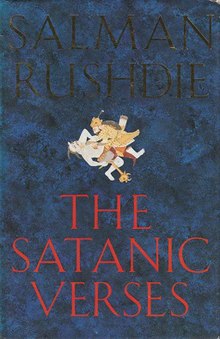
Back The Satanic Verses Afrikaans آيات شيطانية Arabic ايات شيطانيه ARZ شیطان آیهلری AZB দ্য স্যাটানিক ভার্সেস Bengali/Bangla Els Versos Satànics Catalan ئایەتە شەیتانییەکان CKB Satanské verše (román) Czech The Satanic Verses Welsh De sataniske vers Danish
 Cover of the first edition, showing a detail from Rustam Killing the White Demon from the Large Clive Album in the Victoria and Albert Museum | |
| Author | Salman Rushdie |
|---|---|
| Country | United Kingdom |
| Language | English |
| Genre | Magic realism |
| Published | September 26, 1988 |
| Publisher | Viking Penguin |
| Media type | Print (Hardcover and Paperback) |
| Pages | 546 (first edition) |
| ISBN | 0-670-82537-9 |
| OCLC | 18558869 |
| 823/.914 | |
| LC Class | PR6068.U757 S27 1988 |
| Preceded by | Shame |
| Followed by | Haroun and the Sea of Stories |
The Satanic Verses is the fourth novel of British-Indian writer Salman Rushdie. First published in September 1988, the book was inspired by the life of the Islamic prophet Muhammad. As with his previous books, Rushdie used magical realism and relied on contemporary events and people to create his characters. The title refers to the Satanic Verses, a group of Quranic verses about three pagan Meccan goddesses: Allāt, Al-Uzza, and Manāt.[1] The part of the story that deals with the satanic verses was based on accounts from the historians al-Waqidi and al-Tabari.[1]
The book was a 1988 Booker Prize finalist (losing to Peter Carey's Oscar and Lucinda), and won the 1988 Whitbread Award for novel of the year.[2] Timothy Brennan called the work "the most ambitious novel yet published to deal with the immigrant experience in Britain".
The book and its perceived blasphemy motivated Islamic extremist bombings, killings, and riots and sparked a debate about censorship and religiously motivated violence. Fearing unrest, the Rajiv Gandhi government banned the importation of the book into India.[3][4] In 1989, Supreme Leader of Iran Ruhollah Khomeini declared a fatwa against Rushdie, resulting in several failed assassination attempts on the author, who was granted police protection by the UK government,[5] and attacks on connected individuals, including the Japanese translator Hitoshi Igarashi who was stabbed to death in 1991. Assassination attempts against Rushdie continued, including an attempt on his life in August 2022.
- ^ a b Erickson, John D. (1998). "The view from underneath: Salman Rushdie's Satanic Verses". Islam and Postcolonial Narrative. Cambridge, UK: Cambridge University Press. pp. 129–160. doi:10.1017/CBO9780511585357.006. ISBN 0-521-59423-5.
- ^ Cite error: The named reference
Nettonwas invoked but never defined (see the help page). - ^ Manoj Mitta (25 January 2012). "Reading 'Satanic Verses' legal". The Times of India. Archived from the original on 29 April 2013. Retrieved 24 October 2013.
- ^ Suroor, Hasan (3 March 2012). "You can't read this book". The Hindu. Retrieved 7 August 2013.
- ^ "'The Satanic Verses' author Salman Rushdie on ventilator after New York stabbing". Fortune. Retrieved 15 August 2022.
The death threats and bounty led Rushdie to go into hiding under a British government protection program, which included a round-the-clock armed guard
© MMXXIII Rich X Search. We shall prevail. All rights reserved. Rich X Search